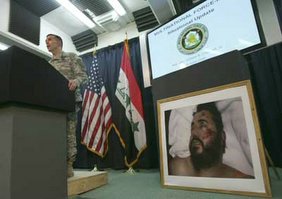SCOTUS GITMO Verdict Smokescreen for Bush Iraq Ploy
[Iraq Prime Minister Nuri al-Maliki’s] recent call for a timetable for the withdrawal of foreign troops and amnesty for Iraq insurgents is a sign of big trouble for the Bush administration. So why aren't we hearing or reading about this every day as part of the discussion on bringing the troops home?—TPM Café, Crissie’s Blog, 6/30/06
It was an extraordinary moment, fraught with the arrogant hyperbole and arrant hypocrisy that has characterized this adventure all along.—Newsweek Reporter Chris Dickey’s description of US Interim head of Iraq Paul Bremer’s secretive and sudden exit from Baghdad
The aftermath of yesterday’s Supreme Court decision that GITMO inmates have rights to a fair trial under international law established by Geneva Conventions has produced an abundance of punditry not seen since the cries of inadequate response to Hurricane Katrina filled the media airways. An objective observer would see that the priority of the two stories isn’t even up for question. Hurricane Katrina was damaging to thousands of lives, and correcting the problem of how to help in such a calamity in the future is immediately pressing.
The verdict in favor of a fair and open trial for some 400 detainees at Guantanamo prison, instead of a secret military tribunal with all of the trappings that implies—no access to attorney, no confrontation of evidence in the charges, and no publicity of a verdict—simply means that any of these inmates who are truly a danger to Americans will have his or her day in court. They’re not letting anyone out of Guantanamo based on the Supreme Court decision yesterday.
In fact, one of the pundits proposed as an expert on the Supreme Court decision, Anthony Napolitano of Fox News, a former judge from New Jersey, explained that the use of military tribunals gave the Bush administration a way to hold trial proceedings against captured foreigners who might pose a threat to Americans, without divulging US government classified material. When Napolitano was asked his opinion of what the US would do if it had the choice of prosecuting one of the GITMO detainees by exposing classified information, or whether the government would prefer not to publicize the classified info, his answer was that the government would most certainly opt not to release anything classified in the interest of national security. Then what would happen to the individual if he was not going to be prosecuted in a lawful open trial? Napolitano simply said that the detainee probably would be sent back to Afghanistan for justice under their system.
Meanwhile, back in reality-land, the real problem of US occupation of Iraq, the moment-by-moment endangerment of human lives, coalition and Iraqi, goes on without a policy burp in sight. The usual rhetoric of fighting the terrorists over there so we don’t have to fight them here is compounded by the flatulent expulsion of the latest in a series of idiotic Dr. Seuess-like logical statements to justify the continuation of US presence in the middle east: John McCain’s comparison of getting out of Iraq with getting out of Vietnam, the gist of which is that when the US vacated Vietnam suddenly, they didn’t follow us back home.
This begs the question of who exactly will “follow” us from Iraq? The connection of terrorists around the world with any headquarters of terrorism in Iraq has never been substantiated. The acknowledged information of US intel authorities has been that cells of terrorist organizations of one back ground or another exist in at least 60 countries globally. US, British, and other coalition presence in Iraq has not stopped terrorist activities in other countries, where the Iraqi insurgents didn’t “follow them home” but others already were there to wreak havoc.
The argument of US occupation of Iraq in order to prevent terrorism in America has always been an empty, specious point of view—politically motivated and not based on any reality.
But this discussion does keep short-term-attention-span John Q. Public distracted from the issue at hand—empire waging colonialism by the US powers-that-be in order to gain an economic sphere of influence in the oil-rich Middle East. Even the most ADD-addled citizen knows that there is some connection between VP Cheney and Haliburton, the company that has reaped enormous revenue by dipping its conglomerated hand into every rebuilding and construction effort for which US taxpayers are overpaying in Iraq.
Now to the case at hand—what is the actual understanding between the US government, i.e. the Bush Administration, and the Iraqi elected government?
In the middle of a war that both the Maliki government and the U.S. forces are trying to win, supposedly by working together, many in Baghdad and Washington would rather not get too explicit about the terms of the relationship. It’s as if this marriage were a romance, and a prenup might spoil all that. But this isn’t a marriage, and so far the U.S.-Iraqi relationship isn’t even a real partnership. It still looks like, and is, an occupation by foreign powers, a quasi-colonial undertaking.— The Rule of Order 17, Newsweek, Christopher Dickey, Shadowlands, 6/29/06
Chris is my friend--he is a veteran foreign correspondent, and a professional. And he is always “on the money,” in that his understanding of the Middle East and the politics involved gives him an unusual view—objectivity with morality. How lucky we are to be the recipient of his hard work, investigative reporting, and intelligent perspective.
Here is his summation, brilliant for its historical reference:
There is a famous quote from the brilliant, troubled and troublesome British Orientalist T. E. Lawrence that one hears quoted often by Americans in Iraq. “Better the Arabs do it tolerably than that you do it perfectly,” they tell each other knowingly—without knowing, perhaps, how grossly condescending they sound. But, like many another famous quote, this one has been edited down by the facile repetition of simple minds. What Lawrence actually said was, “Do not try to do too much with your own hands. Better the Arabs do it tolerably than that you do it perfectly. It is their war, and you are to help them, not to win it for them. Actually, also, under the very odd conditions of Arabia, your practical work will not be as good as, perhaps, you think it is.”
That last line is the one to remember.--The Rule of Order 17, Newsweek, Christopher Dickey, Shadowlands, 6/29/06
And the media talking-head pundits continue to talk about Supreme Court decisions, politics, and the George W view of reality. We must not be deceived by the Deceiver. We the people must keep our attention focused--we need to "re-deploy" our priorities for the best interests of us all--protection of the helpless among us, and feeding those who are hungry. The rest will follow properly.

